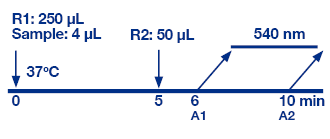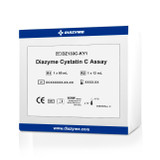Diazyme's Cystatin C Assay is a convenient cost effective dual liquid stable latex enhanced immunoturbidimetric method. This critically important emerging marker aids in the early detection and diagnosis of renal disease. The assay is highly sensitive with a sensitivity of 0.068 mg/L, and an extended linear range from 0.2 - 8.0 mg/L.
| Product | Catalog Number | Format | Method |
|---|---|---|---|
| Kit | DZ133C | R1/R2 (Dual Vial Liquid Stable) | Dual Vial Liquid Stable, Immunoturbidimetric |
| Calibrator | DZ133C-CAL | Cal: 5 Level | |
| Control | DZ133C-CON | Con: 2 Level |
Product Features
Diazyme's Cystatin C Assay is a convenient cost effective dual liquid stable latex enhanced immunoturbidimetric method. This critically important emerging marker aids in the early detection and diagnosis of renal disease. The assay is highly sensitive with a sensitivity of 0.068 mg/L, and an extended linear range from 0.2 - 8.0 mg/L. The Diazyme method has an excellent correlation with existing commercially available products and is highly precise with intra and inter-assay precision CV% of < 5.0%.
Downloads
Informational Articles
Assay Principle
Diazyme's Cystatin C Assay is based on a latex enhanced immunoturbidimetric assay. Cystatin C in the sample binds to the specific anti-cystatin C antibody, which is coated on latex particles, and causes agglutination. The degree of the turbidity caused by agglutination can be measured optically and is proportional to the amount of cystatin C in the sample. The instrument calculates the cystatin C concentration of a patient specimen by interpolation of the obtained signal of a 6-point calibration curve.

Intended use
The Diazyme Cystatin C Assay is an in vitro diagnostic test for the quantitative determination of Cystatin C in serum or plasma by latex enhanced immunoturbidimetric method. The measurement of Cystatin C is used as an aid in the diagnosis and treatment of renal disease. For in vitro diagnostic use only.
Regulatory Status

 Health Canada Registered
Health Canada Registered

